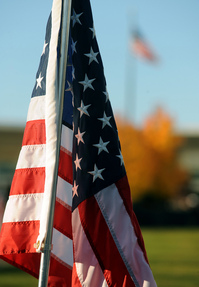Prayer in public: debating the issues of school prayer and 'ceremonial deism'

Veteran's Day observance, Ann Arbor, November 2009
Did you know “the minority” describes the portion of Americans who don’t favor more religious expression in school?
Most Americans do favor prayer in school, according to Gallup. For more than 20 years, large majorities have been in favor of school prayers and, generally, of a greater presence of religion in school life. In 2005, three of four Americans (76 percent) favored “a constitutional amendment to allow voluntary prayer in public schools.” This was about the same in a 1983 poll.
What type of voluntary prayer do people want? It’s not the spoken kind. Most want a silent prayer or a moment of silence.
How do you feel about an official moment of silence or silent prayer? Share your insights over at OurValues.org.
What about public ceremonies?
"Ceremonial deism” isn’t a term one comes across every day. It means that, in certain cases, the government can invoke God.
Recall President Barack Obama’s inauguration last year: He placed his hand on a Bible, held by his wife, as he recited the oath. This was the same Bible that President Abraham Lincoln used in 1861 at his inauguration. You may also recall that both Chief Justice John Roberts and Obama each flubbed the oath.
Roberts added the phrase “so help you God” to the oath. This, it turns out, was Obama’s request.
Obama’s use of a Bible and the appended phrase are OK, say constitutional scholars, because they are examples of “ceremonial deism.” This term was proposed in the 1960s by the then-dean of the Yale Law School. It meant that “conventional and uncontroversial” expressions of religion by government were not violations of the Establishment Clause. (For more details, see Pew’s article on the subject of ceremonial deism.)
The doctrine of ceremonial deism says that our money can include “In God We Trust” on it or that a new legislative session can open with a prayer. These are considered so devoid of religious content and so routine and acceptable that they do not amount to government-sanctioned religious practices.
But one person’s ceremonial deism is not another’s. Some say the phrase “under God” in the Pledge of Allegiance is ceremonial deism; others say it’s not.
Read more and join the conversation over at OurValues.org.
Dr. Baker can be reached at ourvaluesproject@gmail.com


Comments
Freemind42
Wed, May 12, 2010 : 2:48 p.m.
Using your examples of currency and the Pledge of Allegience. God had nothing to do with either of those in their inception. Under God was added in the 1950's to express how the U.S. was not at all like the "Godless" Russians; purely political and transparent. As for the currency, same story. Our country was founded as a secular nation for the protection of both the government from religion and religion from the government. The opinion of the people is fickle and will undoubtedly change over time. I'd be cautious to include anything religious (to any degree) in government. That was the whole point of Thomas Jefferson's push for secularism, first in Virginia and later for the U.S. Constitution.